SUMMARY
This is AI generated summarization, which may have errors. For context, always refer to the full article.
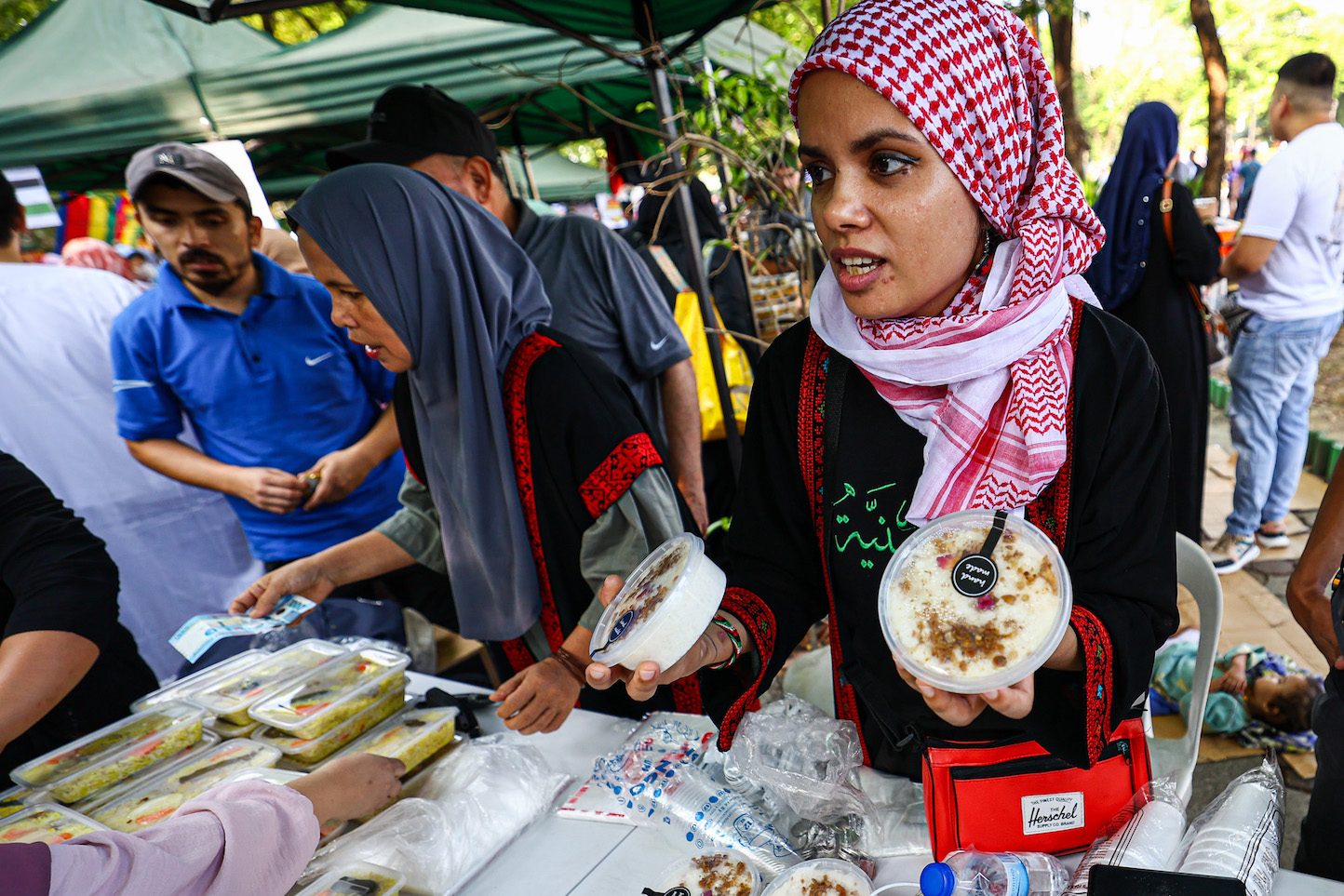
MANILA, Philippines – The smell of shawarma and biryani rice wafted through the air, while a Middle Eastern pop song blasted from a portable speaker.
“Eid Mubarak! Maqluba, a Palestinian dish,” a veiled woman greeted us with a big smile.
It was the Islamic feast of Eid’l Fitr, the end of the fasting month of Ramadan, and Filipino-Palestinian refugees from Gaza marked this event by selling Palestinian dishes at Quezon Memorial Circle in Quezon City.
Through the Little Gaza Kitchen on Wednesday, April 10, the Filipino-Palestinian refugees aimed not only to celebrate Eid’l Fitr, but also to raise awareness about their plight and to support their families now living in the Philippines.
Mahadia Dalal, a 34-year-old mother of two, was one of the Gazan refugees selling Palestinian cuisine at Quezon Memorial Circle on Eid’l Fitr.
She sold maqluba, a traditional Palestinian dish of rice, chicken, and vegetables, which is prepared by turning the cooking pot upside down. (Maqluba literally means “upside down.”) One food writer called it “the paella of Palestine.”
For dessert, there was the rice pudding called roz bi laban. It is a sweet delicacy that has the texture of the Filipino lugaw and the taste of ginataan.
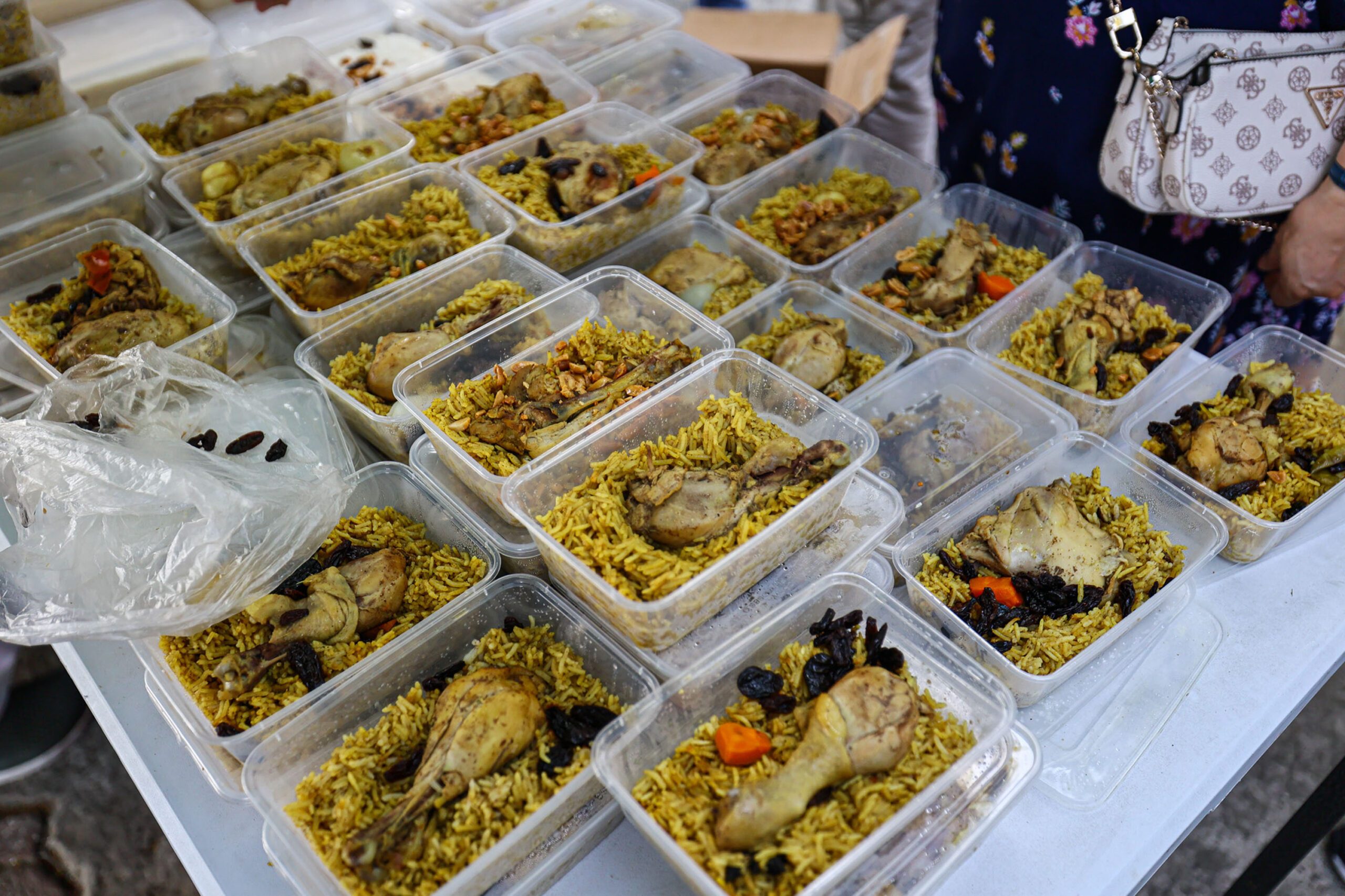
Our coverage team – our videographer, our driver, and myself – each bought one serving of maqluba, which cost P150 or $2.60 per container, as soon as the Little Gaza Kitchen opened at around 8 am on Wednesday. It was the perfect breakfast after our early-morning coverage of Eid’l Fitr prayers a few steps away from the bazaar, which required us to be there as early as 5:20 am.
Bittersweet Eid’l Fitr
The mood at the bazaar was upbeat: the refugees waved, laughed, and greeted visitors with a hearty “Eid Mubarak!” as they explained the ingredients and how they prepared each dish.
Even Dalal was in high spirits when we interviewed her for a Rappler vlog.
“We’re having here maqluba, which we call ‘upside-down,’ because we flip the pot when it’s done…. It’s a really famous dish back in Gaza,” Dalal explained. She also later took a small round container of roz bi laban and introduced this Gazan dessert to the Rappler audience.
When asked how life has been in the Philippines since she fled here in November 2023, Dalal said it is “a great country” and “we love it.”
She also encouraged viewers to support their products to “help us continue our livelihood and have a decent life” in the Philippines. “When we were back in Gaza, we lost our homes, we lost our jobs. We lost everything,” said Dalal, a former English teacher in United Nations refugee camps.
Her upbeat mood gradually turned somber. Then came the final question, after which her voice cracked and tears filled her eyes.
“Mahadia, what is your personal prayer today, Eid’l Fitr?” I asked.
Dalal faced the camera and put her palms together in an impassioned appeal: “I hope: Ceasefire now in Gaza, because people there are suffering still, and they are dying this moment. And I hope that the war and the genocide ends. Inshallah!” (Watch the Rappler vlog below.)

Husband buried in the rubble
When our camera stopped rolling, we continued speaking to Dalal about her life in Gaza – and the tragedies her family has had to face.
The worst incident in the past five months was when her husband was buried in the rubble after Israeli forces demolished their three-story house in Gaza using a missile launched from a plane.
She said 12 people, including her husband’s family, used to live in this house. Most of her in-laws died during this attack in December 2023, and her husband was injured in the face and on the head.
Her husband was in the rubble for a day and a half. “No food, no water,” she said. It was only when the Israeli plane went away that their neighbors “were able to bring him out.” Her husband was then brought to the hospital, and eventually lived in a tent in Rafa.
To make things worse, Dalal was clueless about her husband’s plight until she watched him on Al Jazeera. The television report was aired five days after the bombing.
“I remember I saw him, when I was in the Philippines, I saw the Al Jazeera report, and my husband was on TV – and my house. I didn’t know until I saw the report,” said Dalal, who has a five-year-old son and a one-year-old daughter. “I kept crying. I didn’t believe it. I thought it was a nightmare.”
She immediately contacted the journalist who reported on her husband and asked if the journalist could link her to him. She was later able to speak to her husband, who updated her on his situation.
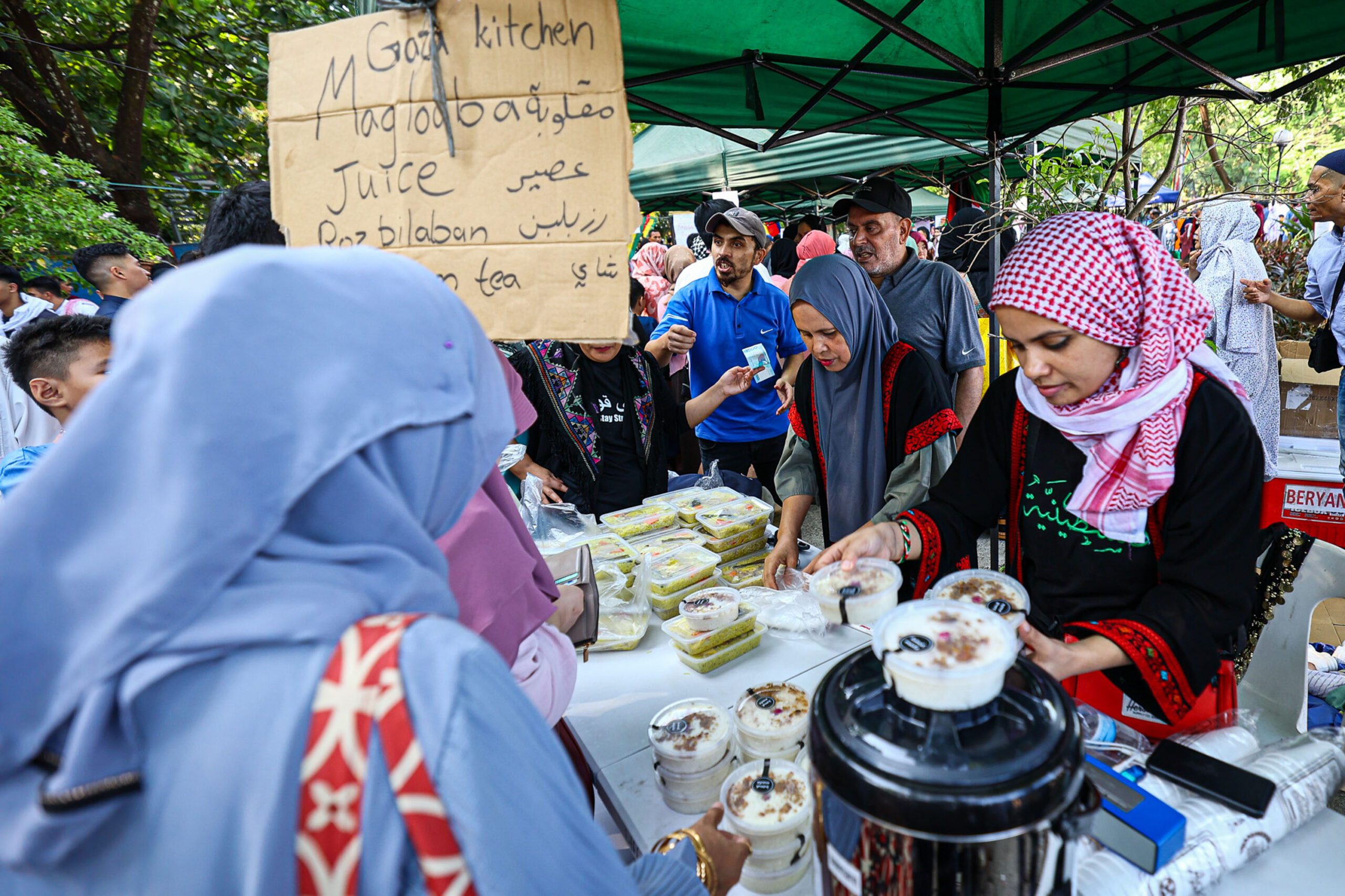
Months later, she requested the Philippine embassy in Jordan to help her bring her husband to the Philippines. Around three weeks before Eid’l Fitr, Dalal’s husband was flown to the Philippines, and is now in the process of recovery.
‘My son died here in the Philippines’
Nagi Alabdla, 52, a Palestinian from Gaza who has a Filipina wife, was also at the Eid’l Fitr food bazaar at Quezon Memorial Circle. He arrived in the Philippines around five months ago.
“How many children do you have?” I asked innocently, only as a matter of fact, without expecting it would drive him to tears.
Alabadla said he has two children – a 24-year-old daughter and a 21-year-old son.
“But my son died here in the Philippines,” Alabadla told Rappler.
His 21-year-old son died from a food-related accident at a local university on December 15, 2023.
“He choked,” he said, explaining that his son died around 30 minutes after that tragic meal. “I am afraid of war, but my son died here.”
Later, Alabadla showed us his daughter, who was also selling food at the Quezon City bazaar.
“One died in the war, the other one died in the Philippines,” Alabadla said.
When asked how he feels on Eid’l Fitr this year, Alabadla broke into tears. The Palestinian said he knows he needs to be happy, but he cannot feel this way “because you know, that war, my family is in Palestine.”
Still, Alabadla said he will do everything for God. “All, anything in my life, for God,” he said.
‘We remember’
Unlike many other parts of the Muslim world, Ramadan for Muslims in Gaza – including those who fled to the Philippines – was a life they have known for a long time, especially after Israel attacked their city in October 2023.
While fasting during Ramadan is a way for Muslims to feel the pains of the poor and oppressed, it is, for Gazans, a suffering that never seems to end.

“The people here have already been fasting for months,” said Dr. Amjad Eleiwa, a deputy director at a Gaza hospital, in an interview published on BBC on March 19, a week after Ramadan began.
“They scour the city looking for food to survive, but they cannot find any,” Eleiwa added.
On Eid’l Fitr, however, the Filipinos who visited the Little Gaza Kitchen – and helped the refugees by buying their dishes – provided a respite for Muslims who have long wanted to break their fast.
A long struggle lies ahead, and Gazan refugees – through their Little Gaza Kitchen – keep their heads up through dignity of labor.
Thirty minutes after we did our interviews and ate our maqluba, a young Palestinian man came running after me. He quickly handed me P5 ($0.8) – the change that I forgot to collect, when I bought from them their roz bi laban dessert for around P120 ($2.11).
“We remember,” the man said with a smile.
He disappeared in the crowd but will never be forgotten. – Rappler.com
Add a comment
How does this make you feel?
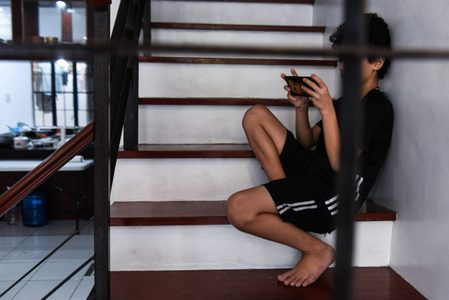
![[The Wide Shot] Peace be with China](https://www.rappler.com/tachyon/2024/07/wideshot-wps-catholic-church.jpg?resize=257%2C257&crop=311px%2C0px%2C720px%2C720px)
![[OPINION] A critique of the CBCP pastoral statement on divorce](https://www.rappler.com/tachyon/2024/07/TL-cbcp-divorce-statement-july-19-2024.jpg?resize=257%2C257&crop=285px%2C0px%2C722px%2C720px)
![[REFLECTION] Mary, Mother of the West Philippine Sea](https://www.rappler.com/tachyon/2024/07/may-mother-west-ph-sea-july-19-2024.jpg?resize=257%2C257&crop=293px%2C0px%2C751px%2C750px)
![[OPINION] Ignorance and prejudice](https://www.rappler.com/tachyon/2024/07/tl-ignorance-and-prejujdice.jpg?resize=257%2C257&crop_strategy=attention)


![[The Wide Shot] Meet the ‘muslim’ Jesus](https://www.rappler.com/tachyon/2024/06/wide-shot-catholic-muslim.jpg?resize=257%2C257&crop_strategy=attention)

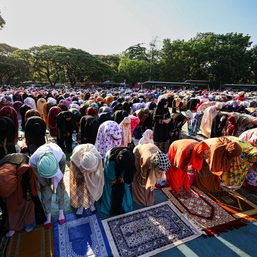

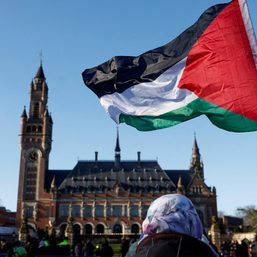



There are no comments yet. Add your comment to start the conversation.